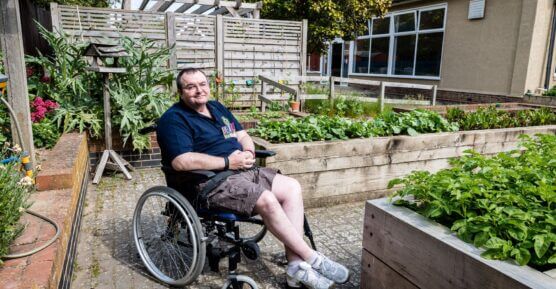
Growing old alongside a life partner is a privilege many of us hope for in later life, but it’s something a lot of people miss out on in care homes.
Moving away from a partner, no matter how long you have been together, can make the transition to a care home a distressing process, but that doesn’t need to be the case.
Many care homes cater for couples and depending on the specific setting, you may be able to share a room or have separate dwellings if you would prefer.
Benefits of care homes for couples
This option allows you to continue to live with your partner, both receiving the care and support you need in later life.
Aside from the biggest benefit of not having to separate, there are many benefits to moving into residential care with a partner.
Smoother process financially
Moving to a care home can not only be difficult emotionally. There are also lots of financial decisions to make when it comes to paying for care.
Moving to a care home together will make it generally easier to work out future finances, without the need to consider a range of scenarios.
The most important financial decision for many couples when it comes to care is what happens to your home. If you decide to move to a care home as a couple, then you will be free to sell your home and use this to directly fund your care, if you need to do so, without worrying about your partner needing to downsize or relocate.
See our article to read more about how jointly owned properties work when it comes to care home fees.
Positive impact on emotional wellbeing
Having to separate from a loved one is arguably the hardest part of moving to a care home, particularly for couples that have been together for a long time.
Moving into a care home as a couple can have a really positive impact on each person’s wellbeing, offering a sense of familiarity and helping both individuals to settle in much easier.
Being in a relationship inherently comes with a concern for the wellbeing of our partner. This is prominent throughout life, but inevitably becomes more apparent as we get older. If you are moving to a care home, it can be worrying to think about what will happen to your partner now and in the future, and if you pass away before they do.
Peace of mind
Moving to a care home together can help to minimise this worry as you’ll have the peace of mind that your significant other will continue to receive quality care in the residential setting you have both chosen.
Being familiar with the people who will care for your partner and experiencing the environment first hand should give you both peace of mind that you will both be in the best place no matter what the future holds.
24/7 care and support
Living in a care home ensures you receive the care and support you need 24 hours a day without having to plan carer visits or ask a family member to do the weekly food shop for you, for example.
Taking away these everyday pressures mean that you can spend your days enjoying time with your loved one and making the most of the facilities your chosen home offers, such as watching a movie in the cinema room, enjoying a drink in the café or on-site bar, or even trips out in your local community.
Couples in a care home
Jack and June
When Jack Keith, a Physical Trainer in the Army, first set eyes on June, who was part of the Women’s Royal Army Corps, back in 1950, it was love at first sight.
“June’s unit wanted to use our gym for a dance, and because it was our gym, we were allowed to attend too. I saw this beautiful woman walk in and thought ‘Oh God, I’m going to marry her!’. Luckily for me, the fellow she was with had to go early, so I went up to her, and that was it!”
The couple now reside together at Royal Star & Garter’s care home in Surbiton and recently celebrated their 70th anniversary.


Speaking about his and June’s relationship, Mr Keith said: “It’s been a wonderful 70 years. I have a good wife and I can’t fault her. I’ve been very lucky.”
Bob and Rosemary
Bob & Rosemary Harding married in 1982 and have been together ever since.

Now the pair live at Royal Star & Garter’s home in Surbiton in South West London.
Mrs Harding says: “I’ve just been living with somebody I love. We’ve been married nearly 40 years, and together a lot longer, but for me the time hasn’t really passed.”
Mrs Harding says that she feels “lucky to be together with Bob at Royal Star & Garter.”
Image Credit Royal Star & Garter
Generally speaking, most care homes should be able to cater for both you and your partner, regardless of your differing care needs. Depending on availability and their resources, they may offer you a shared room or two private rooms.
Finding a care home for couples
This decision could also depend on your care requirements. For example, if your partner has dementia but you don’t, the care home may prefer for your partner to reside in a dementia specific part of the home.
Regardless of your individual care needs, the care home should facilitate you and your partner to spend time together and meet your needs as a couple as well as individually.
Things to consider
- Making plans before you need care – this will help to make your decision less urgent, and you may be able to wait until spaces become available if you have a specific care home in mind.
- Reaching out to a number of care homes – this is part and parcel of looking for a care home in general, but it’s beneficial to find out about what different settings offer and how they can cater to you and your partner, both now and in the future.
- Checking review scores – review scores can give you a really good idea of what other people think of a care home. The leading site for care home reviews, carehome.co.uk offers the option to filter your search based on review scores, showing you the homes with the highest reviews in a chosen area from relatives and loved ones.
Bear in mind that if you going to self-fund your care, you should make sure you are able to cover the fees for both you and your partner to stay in the home you’ve chosen throughout every eventuality, including your care needs progressing. Doing this will ensure that there are no hidden surprises when it comes to your care, and you and your partner can enjoy later life together with the peace of mind that everything is taken care of.
On carehome.co.uk, you can search for care homes that offer rooms for couples by using the advanced search and select Couples/Companion Rooms under the ‘Room Type’ option..
Falling in love in a care home
Some residents even enter a care home single and manage to find love there. You can read Marion and Stuart Potter’s story in our article Love in a care home.

